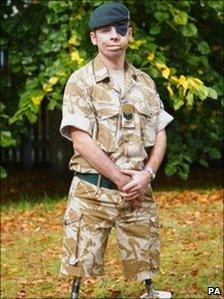Injured Telford soldier to get Military Cross
- Published

Cpl Furgusson saved men's lives after several explosions
A soldier who lost both his legs and an eye in a bomb blast is to receive the Military Cross for his bravery.
Cpl Ricky Furgusson, 25, from Telford, Shropshire, helped soldiers wounded by improvised explosive devices (IEDs) on four separate occasions in Afghanistan.
He ignored the "ever-present IED threat" to save men's lives, his citation notes said.
A total of 131 members of the armed forces are to be awarded medals in the latest Operational Awards List.
Cpl Furgusson will be presented the medal, which recognises exemplary gallantry during active operation, by the Queen at a later date.
Cpl Furgusson, of the 4th Battalion The Rifles, was on his first patrol in Sangin District in October 2009 when his squad was hit by a large IED.
He immediately helped a stricken colleague with no regard for his own safety and then helped in his evacuation - saving the man's life.
'Outstanding leadership'
A month later, he went to help comrades twice in one day and saved a second man's life, the Ministry of Defence (MoD) said.
His bravery again came to the fore at the end of 2009.
He was able to stabilise and evacuate another soldier within 35 minutes of being caught in an explosion, although the man later died from his injuries.
Cpl Furgusson was himself injured by an IED and severely wounded on 13 January. He lost both legs and his left eye, fingers from both hands and also suffered facial scars.
His citation states: "Furgusson's bravery, personally ignoring the ever-present IED threat when dashing to the aid of wounded men, and his outstanding leadership, time and again rallying his soldiers in the disorientating aftermath of IED strikes, saved men's lives.
"For his selfless actions he is to be awarded the MC."
Cpl Furgusson said he was shocked to be given the medal.
"I'm very pleased. I had a slight inkling I might get an award but an MC was totally out of the window and I wasn't expecting that at all," he said.
"I don't think it has quite sunk in at all and it won't until I walk into Buckingham Palace."
The soldier, who spent four months at Birmingham's Selly Oak Hospital, said he had been just been looking out for his comrades.
"As section commander you look after those in your section. Unfortunately some of those attached to our section got hit by IEDs," he said.
"I was always one of the first to get there to give them the best first aid possible."
He added he was soon getting prosthetic legs and was determined to walk again.
- Published24 September 2010
- Published24 September 2010